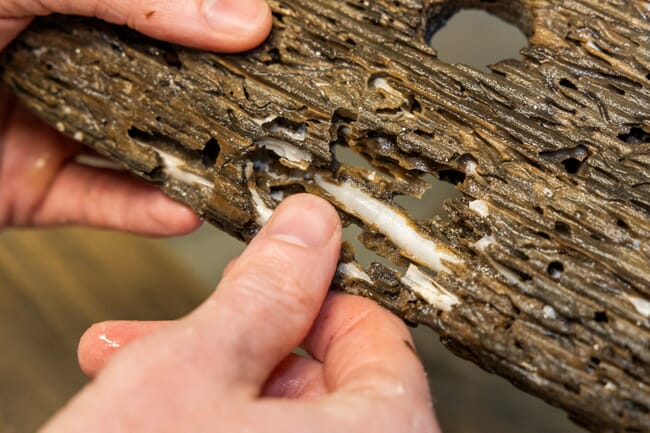
© Alan Williams
Shipworms are the fastest-growing bivalve, reaching up to 30cm long in as little as six months. They do this by burrowing into waste wood and converting it into the nutrients they need. Scientifically named teredinids, these creatures have a tiny shell, but are classed as bivalve shellfish and related to oysters and mussels.
The researchers at the University of Plymouth and the University of Cambridge, reported that the levels of Vitamin B12 in the shipworms - which they have rebranded as naked clams - were higher than in most other bivalves – and almost twice the amount found in blue mussels.
It was demonstrated that with the addition of an algae-based feed to the system, the naked clams can be fortified with omega-3 polyunsaturated fatty acids - nutrients essential for human health.
Shipworms have traditionally been viewed as a pest because they bore into any wood immersed in seawater, including ships, piers and docks.
First author of the study, Dr David Willer, from the University of Cambridge, stated in a press release: “We’re growing them using wood that would otherwise go to landfill or be recycled. They also taste like oysters, are highly nutritious, and can be produced with a low impact on the environment.”
Because the naked clams don’t put much energy into growing shells, they grow much faster than mussels and oysters, which can take up to two years in traditional aquaculture to reach market size.
Building a market - and farming system - for shipworms
At present, wild shipworms are eaten in the Philippines - either raw or battered and fried like calamari. However, for British consumers, the researchers stated that in their belief, naked clams will be more popular as a "white meat" substitute in processed foods like fish fingers and fishcakes.
The researchers have also developed a fully enclosed aquaculture system to successfully grow naked clams. The system can be completely controlled, addressing the water quality and food safety concerns often associated with mussel and oyster farming.
“We urgently need alternative food sources that provide the micronutrient-rich profile of meat and fish but without the environmental cost, and our system offers a sustainable solution,” added Dr Reuben Shipway at the University of Plymouth, and senior author of the report.
The research has attracted funding from sources including The Fishmongers’ Company, British Ecological Society, Cambridge Philosophical Society, Seale-Hayne Trust, and BBSRC.
The team is now trialling different types of waste wood and algal feed in their system to optimise the growth, taste, and nutritional profile of the naked clams – and is working with Cambridge Enterprise to scale-up and commercialise the system.




